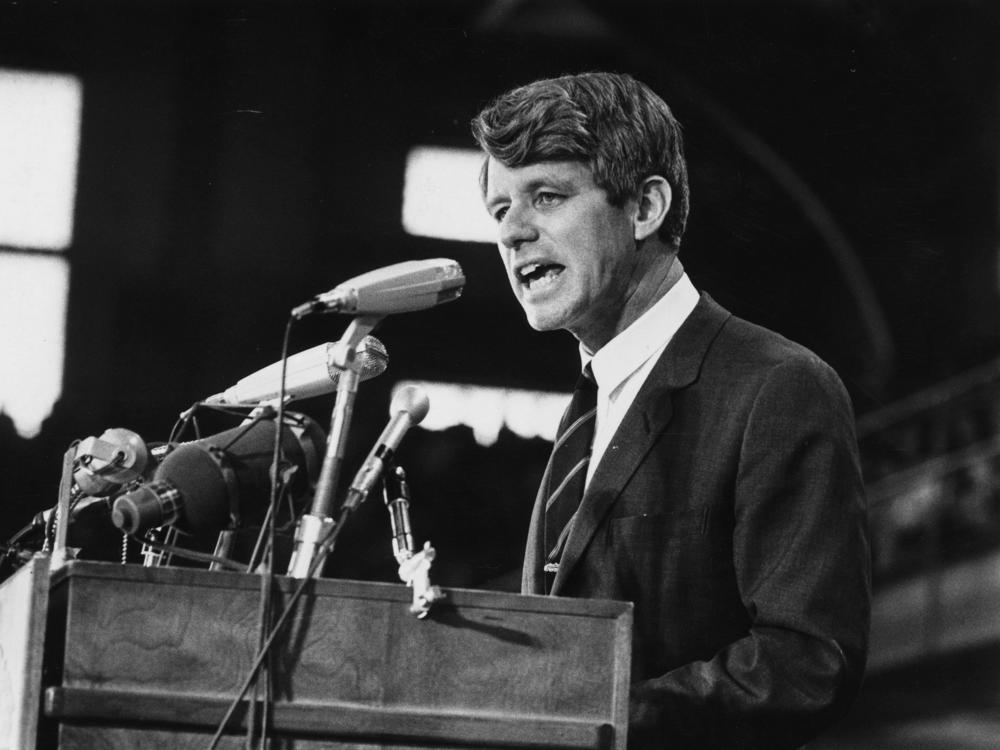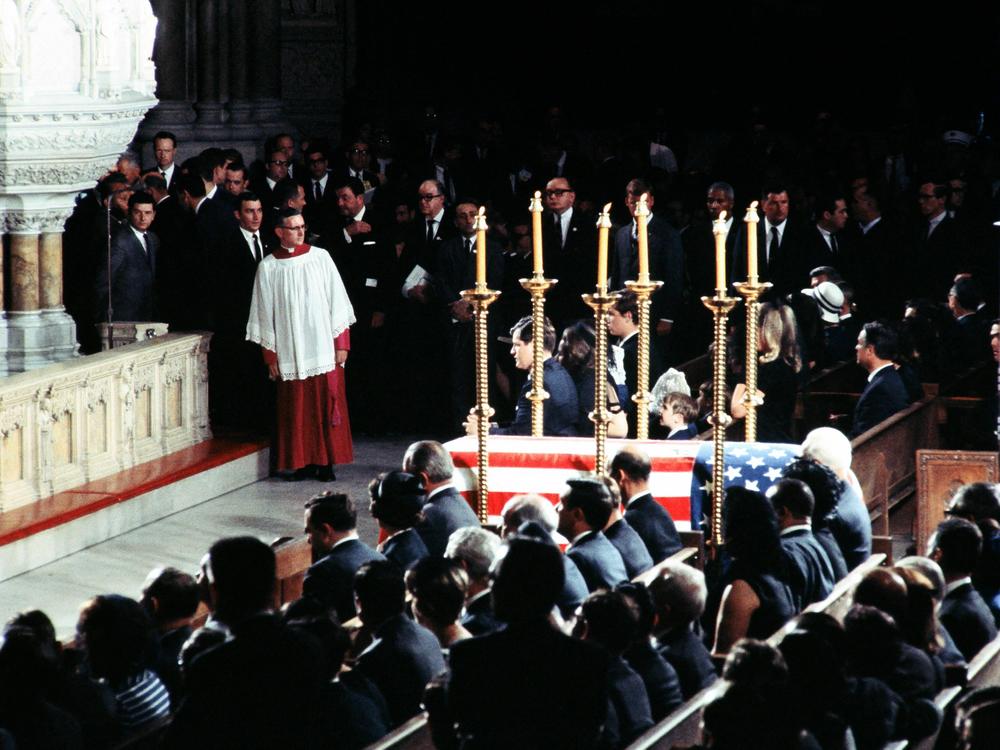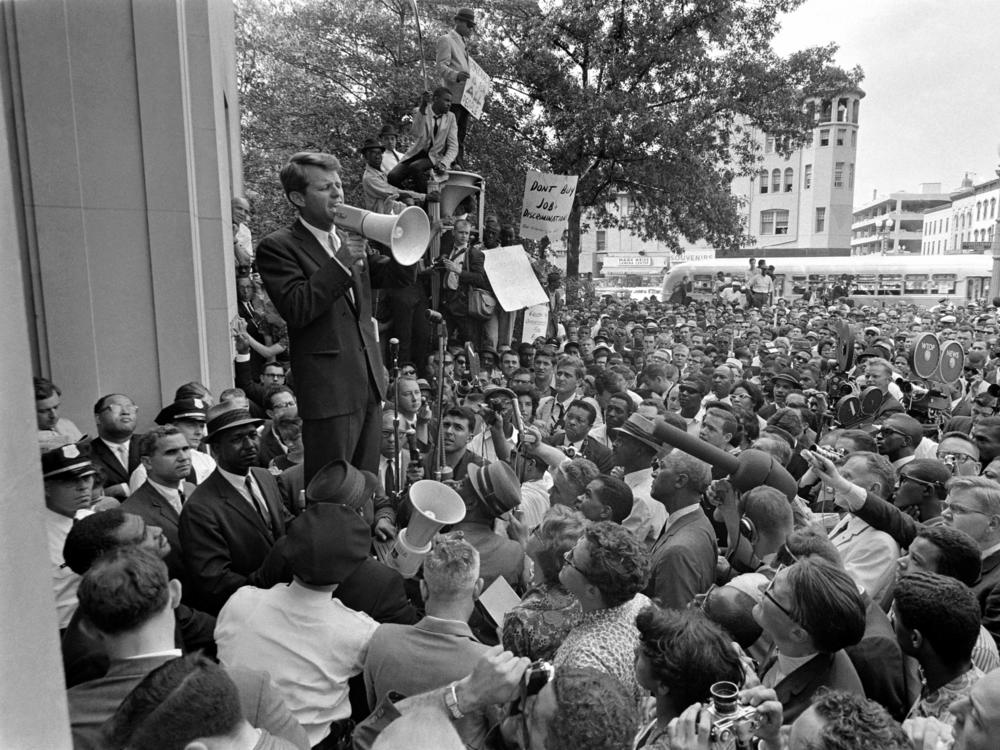Section Branding
Header Content
Robert Kennedy was killed 55 years ago. How should he be remembered?
Primary Content
Just after midnight on June 5, 1968, in a ballroom in the ornate Ambassador Hotel in Los Angeles, a packed crowd watched charismatic presidential candidate Robert F. Kennedy give a victory speech after winning the California primary.
Almost five years after his older brother John F. Kennedy was assassinated in Dallas, Robert Kennedy was making his own run for the White House. America was divided over the Civil Rights Movement and the war in Vietnam.
The New York senator was gaining momentum to potentially secure the Democratic nomination. But that night — 55 years ago today — was the last time he would address the public.
A second Kennedy assassinated
As Kennedy walked off stage at the Ambassador Hotel through a pack of eager reporters, the crowd chanted his name.
"We want Bobby," they cheered.
Kennedy shook hands with supporters and exited the ballroom through the kitchen. Then, the crowd heard what witnesses would later describe as the sound of firecrackers. A gunman fired a .22 caliber revolver, hitting Kennedy and injuring five others.
Olympic gold medalist Rafer Johnson — one of Kennedy's friends who worked on his campaign — wrestled the gunman to the ground and tried to disarm him.
Amid the chaos, teenage busboy Juan Romero comforted Kennedy, who was sprawled out on the floor.
"I kneeled down to him and put my hand between the cold concrete and his head just to make him comfortable," Romero told StoryCorps in 2018. "I could feel a steady stream of blood coming through my fingers. I had a rosary in my shirt pocket, and I took it out thinking that he would need it a lot more than me. I wrapped it around his right hand, and then they wheeled him away."
Kennedy died the next day. He was 42. His widow, Ethel, was pregnant with their 11th child.
Campaigning on race, with some contradictions
Mourners lined up before dawn outside New York City's St. Patrick's Cathedral for Kennedy's funeral mass. Inside the church, Sen. Ted Kennedy delivered the eulogy.
"As he said many times in many parts of this nation: Some men see things as they are and say 'Why?' " Kennedy said. "I dream things that never were and say 'Why not?' "
Robert Kennedy was memorialized as a liberal icon who found support among Black and Latino voters.
"He made a virtue of abrasiveness in his 1968 campaign, deliberately taunting affluent constituencies on behalf of the disadvantaged," NPR commentator Rod MacLeish said in 1983.
But Kennedy was complicated and contradictory, especially when it came to one particular decision. As U.S. attorney general, he authorized the FBI to wiretap Martin Luther King Jr.'s telephones in 1963, because of suspicion that one of King's aides had communist ties.
But Kennedy was a well-known advocate for marginalized communities and spoke about racial equality during his campaign. Two months before his own death, Kennedy gave an impromptu speech to a mostly Black crowd in Indianapolis about the assassination of Dr. King.
"What we need in the United States is not violence and lawlessness, but love and compassion toward one another, a feeling of justice toward those who still suffer, whether they be white or whether be Black," he said.
On the day Kennedy died, Congress responded by expanding Secret Service protection to include major presidential candidates. The man who shot Kennedy was convicted of first-degree murder and continues to serve a life sentence.
The room where it happened
Today, there is no Ambassador Hotel. It was demolished in 2006.
The site in LA is now a complex of public schools called the Robert F. Kennedy Community Schools. There are vibrant murals all over campus and in the hallways. The walls of the school library are adorned with portraits and huge, colorful paintings of Kennedy.
Most of the students there are Latino. Over the years, many of the students who graduate are the first in their families to attend college.
Copyright 2023 NPR. To see more, visit https://www.npr.org.



